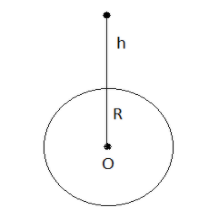
Value of Gravitational Constant ‘G’ is
$\begin{align}
& A)6.67408\times {{10}^{-11}}{{m}^{3}}k{{g}^{-1}}{{s}^{-2}} \\
& B)4.67408\times {{10}^{-11}}{{m}^{3}}k{{g}^{-1}}{{s}^{-2}} \\
& C)6.67408\times {{10}^{11}}{{m}^{3}}k{{g}^{-1}}{{s}^{-2}} \\
& D)6.67408\times {{10}^{-11}}{{m}^{3}}k{{g}^{-2}}{{s}^{-2}} \\
\end{align}$
Answer
591k+ views
Hint: Gravitational Constant is the universal constant and one should memorize its value but in case you have forgotten that value. Then find the formula through which we can find the value of the gravitational constant one of the formula is $g=\dfrac{GM}{{{R}^{2}}}$ . We know the value of acceleration due to gravity g, Mass of the earth, and Radius of the earth.
Formula used:
Gravitational Force between two objects, one of Mass $M$ and the other of mass \[m\] , which are separated by a distance $r$ is given by:
$F=\dfrac{GMm}{{{r}^{2}}}$
Where, $G$ is Gravitational Constant.
Also, \[\text{Force = Mass }\!\!\times\!\!\text{ Acceleration}\]
$F=ma$
Complete step by step answer:

To determine the value of the gravitational constant, firstly, let us place an object of mass $m$ at a height$h$ above the earth’s surface. Then gravitational force exerted by the earth on that object is given by
$F=\dfrac{GMm}{{{r}^{2}}}$
Here, \[r\text{ }=\text{ }R+h\]
$F=\dfrac{GMm}{{{(R+h)}^{2}}}$
If the object of mass $m$ is on the surface of the earth, therefore \[h=0\] .
$F=\dfrac{GMm}{{{R}^{2}}}$
Also, acceleration is given as force divided by mass i.e. $a=\dfrac{F}{m}$ .
Therefore acceleration due to gravity is the gravitational force divided by the mass of the object.
But, $g=\dfrac{GM}{{{R}^{2}}}$
Or, $G=\dfrac{g{{R}^{2}}}{M}$. Substituting the value of \[\text{g, M, R}\] in this formula we easily find the value of the gravitational constant.
$\begin{align}
& g=9.8m{{s}^{-2}} \\
& R=6400km=6.4\times {{10}^{6}}m \\
& M=6\times {{10}^{24}}kg \\
& G=\dfrac{g{{R}^{2}}}{M}=\dfrac{9.8\times {{(6.4\times {{10}^{6}})}^{2}}}{6\times {{10}^{24}}} \\
& G=6.67408\times {{10}^{-11}}{{m}^{3}}k{{g}^{-1}}{{s}^{-2}} \\
\end{align}$
Hence, option A is correct.
Note:
We must know that gravitational force is one of the weakest forces in nature. The Gravitational constant remains as a constant everywhere. Although acceleration due to gravity changes with altitude, depth, and rotation of earth but Gravitational constant never changes. If we compare the electrostatic force and gravitational force, we can find that gravitational force is \[{{10}^{36}}\] times smaller than the electrostatic force.
Formula used:
Gravitational Force between two objects, one of Mass $M$ and the other of mass \[m\] , which are separated by a distance $r$ is given by:
$F=\dfrac{GMm}{{{r}^{2}}}$
Where, $G$ is Gravitational Constant.
Also, \[\text{Force = Mass }\!\!\times\!\!\text{ Acceleration}\]
$F=ma$
Complete step by step answer:

To determine the value of the gravitational constant, firstly, let us place an object of mass $m$ at a height$h$ above the earth’s surface. Then gravitational force exerted by the earth on that object is given by
$F=\dfrac{GMm}{{{r}^{2}}}$
Here, \[r\text{ }=\text{ }R+h\]
$F=\dfrac{GMm}{{{(R+h)}^{2}}}$
If the object of mass $m$ is on the surface of the earth, therefore \[h=0\] .
$F=\dfrac{GMm}{{{R}^{2}}}$
Also, acceleration is given as force divided by mass i.e. $a=\dfrac{F}{m}$ .
Therefore acceleration due to gravity is the gravitational force divided by the mass of the object.
But, $g=\dfrac{GM}{{{R}^{2}}}$
Or, $G=\dfrac{g{{R}^{2}}}{M}$. Substituting the value of \[\text{g, M, R}\] in this formula we easily find the value of the gravitational constant.
$\begin{align}
& g=9.8m{{s}^{-2}} \\
& R=6400km=6.4\times {{10}^{6}}m \\
& M=6\times {{10}^{24}}kg \\
& G=\dfrac{g{{R}^{2}}}{M}=\dfrac{9.8\times {{(6.4\times {{10}^{6}})}^{2}}}{6\times {{10}^{24}}} \\
& G=6.67408\times {{10}^{-11}}{{m}^{3}}k{{g}^{-1}}{{s}^{-2}} \\
\end{align}$
Hence, option A is correct.
Note:
We must know that gravitational force is one of the weakest forces in nature. The Gravitational constant remains as a constant everywhere. Although acceleration due to gravity changes with altitude, depth, and rotation of earth but Gravitational constant never changes. If we compare the electrostatic force and gravitational force, we can find that gravitational force is \[{{10}^{36}}\] times smaller than the electrostatic force.
Recently Updated Pages
Master Class 11 Computer Science: Engaging Questions & Answers for Success

Master Class 11 Business Studies: Engaging Questions & Answers for Success

Master Class 11 Economics: Engaging Questions & Answers for Success

Master Class 11 English: Engaging Questions & Answers for Success

Master Class 11 Maths: Engaging Questions & Answers for Success

Master Class 11 Biology: Engaging Questions & Answers for Success

Trending doubts
One Metric ton is equal to kg A 10000 B 1000 C 100 class 11 physics CBSE

There are 720 permutations of the digits 1 2 3 4 5 class 11 maths CBSE

Discuss the various forms of bacteria class 11 biology CBSE

Draw a diagram of a plant cell and label at least eight class 11 biology CBSE

State the laws of reflection of light

Explain zero factorial class 11 maths CBSE




